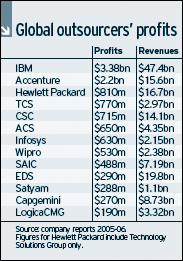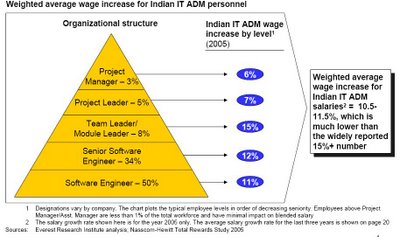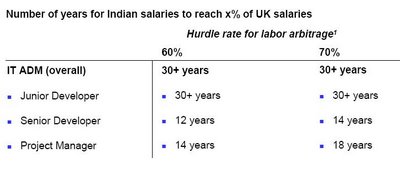When Pearl, one of the UK's oldest insurers, hived off 950 jobs last month to an Indian outsourcing company, it could have been just another chunk of a historic industry disappearing offshore. After all, April had already seen announcements from Prudential and ABN Amro of hundreds more jobs to go in the UK financial sector, with India picking up the gains.
Tata Consultancy Services (TCS), Pearl's chosen outsourcer, has been clocking up the big deals of late. ABN Amro signed a £140m contract with the company in September to offshore 200 jobs, and Deutsche Bank is in final-stage negotiations to outsource even more in a deal worth at least £280m.

But the Pearl deal is different. Instead of shipping jobs to steamy Mumbai, TCS set up a joint venture with Pearl called Diligenta, and employees processing closed-book claims will remain at their desks in Peterborough.
Worth £486m over 10 years, the contract, which was first announced last October, is the largest-ever deal for an Indian outsourcer, and a potential IT deathtrap. Pearl has 11 legacy systems which TCS plans to combine before touting its solution to other insurers. "It's a very high-risk process," says Catherine Schmitt from research firm Celent. "A lot of the industry are holding their breath and saying 'let's see what happens'."
TCS hopes Diligenta will help it to woo a clutch of European insurers that are struggling with high operating costs but are culturally biased against sourcing out. "The UK has always been more open in insurance for offshoring but the Continental market is much more nationalistic," says Schmitt. "Tata is reacting to that by setting up an office in Hungary because there is less of an issue if you have a base in the EU."
TCS now has 4,500 employees outside India, and as the trend continues it will change how we define Indian companies, says Seturaman Mahalingam, the company's global finance director.
"If you look at the regional scene, in Europe we have capability in Budapest and in South America we have Sao Paulo. In Asia we are in China, Yokohama, and Melbourne, those kinds of places. So does that make us an Indian company? I don't know. What is an Indian company? IBM? They have 35,000 people in India. Accenture, with 16,000 people there? That distinction has blurred."
As befits an economy with 500m workers that is growing at 8pc a year, India's largest IT companies - the "big three" - are starting to bulk up. In recent results, Wipro and Infosys both reported revenues above $2bn for the first time while TCS's were just short of $3bn. The company's next target is to beat $10bn by 2010 with sales increasing 36pc a year. Not only are revenues growing, but Indian firms are doing it on margins of 25pc to 30pc, more than double those of mature players such as Accenture and IBM.
Of course, growing so fast presents its own problems. Last year TCS almost doubled its workforce by recruiting 27,377 people - 75 a day - and once took out 1,000 job ads in a single morning.
"There are issues," says Mahalingam. "For example the wages in India will go up. There is a tendency towards it already because it is a competition amongst everyone and everyone is recruiting." This has already driven up prices in the labour market, with IT wage inflation already at 10pc to 15pc a year. "And there will be currency appreciation because our functional currency is still the rupee. So there are dangers."
These dangers are the other force driving TCS's expansion on to Western shores. With costs at home going up, the company can now grow fastest by taking over existing workforces overseas. And as well as working with Indian university faculties to squeeze out more graduates, it is recruiting directly from prime British universities such as York and Queen's, Belfast.
The biggest prize for TCS is to break into higher-value business consulting work in the UK and US. Completing a blockbuster engagement like Pearl may get the firm on to a few more shortlists for this sort of work.
"I think people possibly underestimate TCS," says Schmitt. "There has been a lot of criticism of the Indian providers for being good at the technology but not really understanding the business, but that is changing. Companies like Accenture have moved down the value chain from highbrow strategy work to systems. The Indian guys are coming from a background as engineers and they are meeting and starting to compete in the middle."
Mahalingam responds to talk of the company's growing international recognition with a wry smile. He first came to the UK in the early Seventies to work on a systems migration job for Burroughs, and TCS has been quietly carving out a sizeable niche in systems here ever since.
"We have been here since 1974," he says. "It's just now, we are being noticed."



